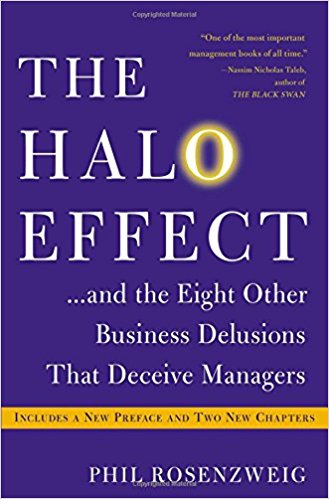The Halo Effect Summary
5 min read ⌚
 …and the Eight Other Business Delusions That Deceive Managers
…and the Eight Other Business Delusions That Deceive Managers
Businesspeople, executives, and managers are under the influence of numerous illusions. Having in mind the constant pressure that they feel to get better and produce better financial results, it is understandable why they look for simple stories that motivate them.
Who Should Read “The Halo Effect”
“The Halo Effect” is a mind-altering book, that will change the way many individuals go about pursuing managerial excellence. Additionally, it will influence them to revise the criteria they have set for managing. Rosenzweig challenges the concepts that are connected to the qualities that fuel business performance.
He poses the right questions about past research and the basis on which they were conducted and is making an inquiry about what makes a company great.
According to the author, previous studies have depended on flawed research systems and techniques that drove writers to give accomplishments credit to organizations that didn’t deserve it.
About Phil Rosenzweig
 Phil Rosenzweig is a professor at one of the world’s leading institutes of executive education – the International Institute for Management Development situated in Lausanne, Switzerland. He holds a Ph.D. from the Wharton School, University of Pennsylvania.
Phil Rosenzweig is a professor at one of the world’s leading institutes of executive education – the International Institute for Management Development situated in Lausanne, Switzerland. He holds a Ph.D. from the Wharton School, University of Pennsylvania.
He has also taught at the Harvard Business School and has authored The Halo Effect. The book was described as “a trenchant view of business and business advice,” by the Wall Street Journal. Nassim Nicholas Taleb called it “one of the most important management books of all time.”
“The Halo Effect Summary”
Usually, they go through success stories and step-by-step guides that show them how to replicate the prosperity of industry legends. However, these stories are typically oversimplified and don’t show the whole picture. At times this can influence managers to believe that the application of a few steps and recommendations can (and most certainly will) solve their problems. But, all that is a fantasy.
Managers have to become more selective about the things they believe are doable. They have to stay rational and avoid making decisions based on their emotions, as well as quick-fix ideas.
In reality, formulas don’t apply to businesses. You cannot replicate or predict your steps based on what other successful companies did. The economy, the market forces, the customers’ needs, the technology, the education – it is all continually changing.
There are no guaranteed results in business. You have to assess the situation and act based on the current position you are in, instead of blindly following advice.
Another key point to mention is that the most popular business books do not get their bestseller status according to the reliance on hard data and extensive research.
On the contrary, they become bestsellers based on how well they are written and how well the authors have built their “stories.” “From rags to riches” has always been a story that people were interested in.
Authors use the same concept in most books that present to you cases where struggling business transformed into successful companies.
However, not only writers try to simplify the topic of business success. Business schools do it as well. They often try to find explanations about how companies achieve greatness. They do that by identifying the ways a small improvement in one area of the organization can enhance overall performance.
The result of all of these trends is the popularization of such success stories presented as science.
You need to be aware that most of the time the strategy is not at fault for your failure. In most cases is the execution that is “guilty” for poor performance. The most dangerous delusion that exists is that managers can just decide to make the company great, and if it is not – it is entirely their fault.
The business world does not function that way. As it was previously stated, no quick-fix or formula can make your company prosperous. Instead, aim for day-to-day victories. And, if you must have a recipe in mind, why don’t you try “persistence”?
Key Lessons from “The Halo Effect”
1. The Halo Effect
2. Connecting the Winning Dots
3. Lasting Success
The Halo Effect
Both positive and negative general impressions you may have about company influence your judgment.
If you think well of a particular business, you will attach positive attributes to anything connected to it, even without logical proof. Oppositely, if your negative impression is high, you would most probably rate everything about it poorly. This is called “the halo effect,” and it can refer to both companies and people.
Cognitive dissonance theory explains this phenomenon, arguing that humans desire a cohesive picture of the world that they brush off everything that contradicts their preconceived worldview.
Connecting the Winning Dots
Most of the time researchers look for similar traits among prosperous companies. This kind of research does not allow them to objectively assess the businesses since they have already picked top performers only. That means that they don’t study how poorly executed companies measure up to the criteria they have set.
Other than that, performance depends on different parts of the company. One assessed aspect is not enough for you to be able to measure performance. Nonetheless, many books try to link the success of the business to a single trait like social responsibility or management.
When you estimate your company’s performance, make sure to do it related to the competitors in your industry. Be careful not to look at it as an absolute value.
Lasting Success
Don’t be sure that once you get lucky, it will last forever. Market forces continually influence performance.
You can achieve long-term prosperity only by connecting short-term achievements. Don’t pursue your goals methodically. Flexible ways of thinking will get you further.
Studies have shown that people with changing worldviews can process more information and make more accurate predictions of the situations to follow.
Like this summary? We’d Like to invite you to download our free 12 min app, for more amazing summaries and audiobooks.
“The Halo Effect” Quotes
Success is not random - but it is fleeting. Share on X Now, there's nothing wrong with stories, provided we understand that's what we have before us. Share on X Numbers don't lie, we like to say, which is why Enron, Tyco, and a handful of other recent scandals shake our confidence so deeply. Share on X We may not really know what leads to high performance, so we reach for simple phrases to make sense of what happened. Share on X The bigger the claim, the larger the headline...the greater the temptation to overlook rival explanations. Share on XOur Critical Review
Rosenzweig presents his fascinating thoughts on the topic clearly, and flavors his writing with specific cases research, adding to the book’s quality.
Subsequently, this coherent and focused book would make an enjoyable, memorable read, to anyone who is not afraid of realizing their faults and changing their mind.
Emir is the Head of Marketing at 12min. In his spare time, he loves to meditate and play soccer.


 …and the Eight Other Business Delusions That Deceive Managers
…and the Eight Other Business Delusions That Deceive Managers




